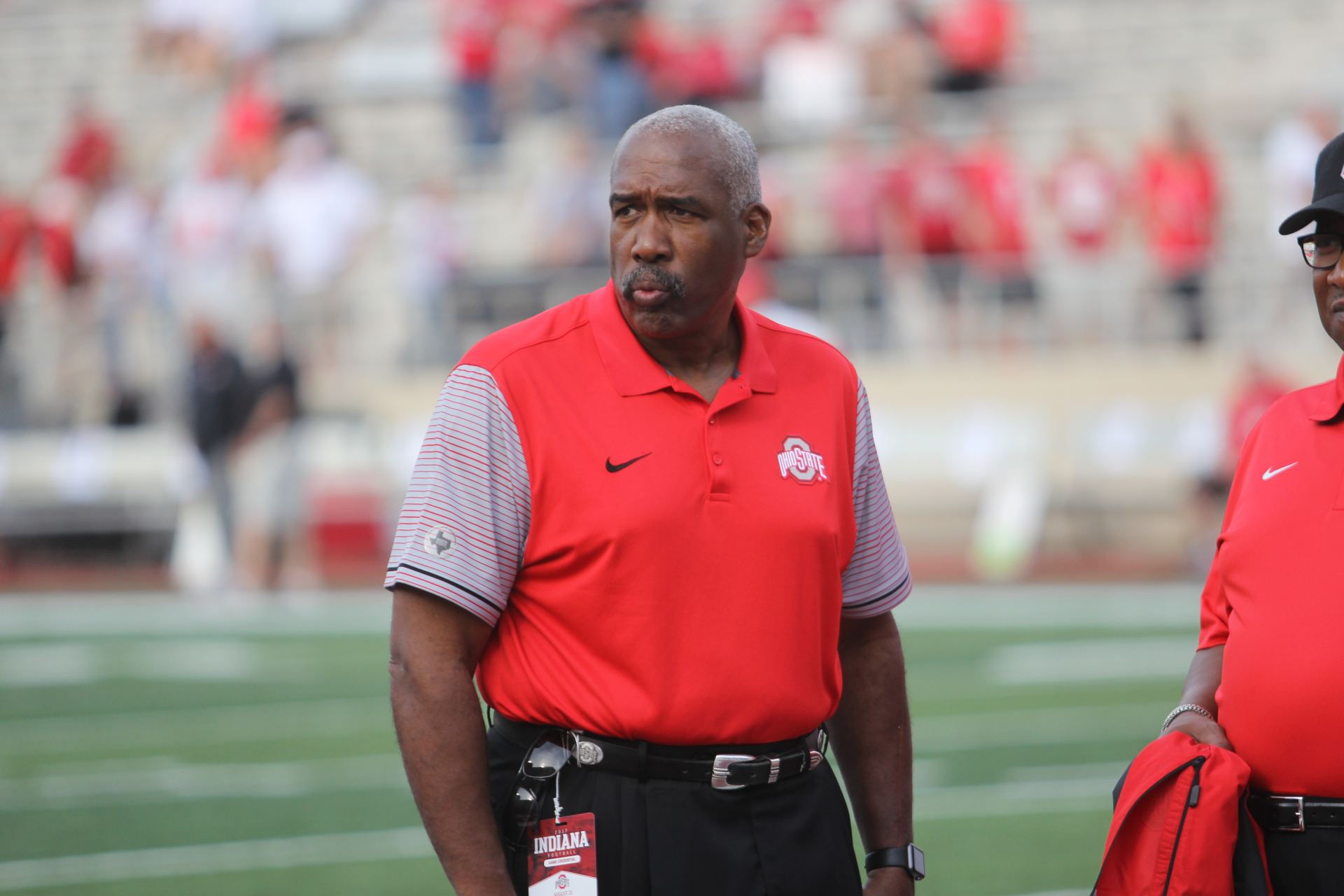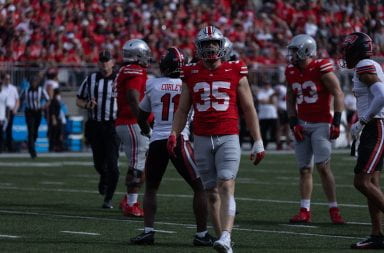
An official signals for a touchdown during a game between Ohio State and Alabama on Jan. 1, 2014. OSU won, 42-35. Credit: Lantern file photo
From the summer following seventh grade up through my senior year of high school, I umpired youth baseball and softball games for my city’s league back near Cleveland.
I retired from playing in the league myself, so still being able to be involved with the sport was the main reason I picked up the job. It was a blast. I worked games with my friends, got to make money and learned valuable lessons about dealing with enraged parents.
Over the course of my five years umpiring, I called countless numbers of games. In each game, I made the right call more often than not. I’d like to humbly think I was a pretty good umpire, but I’ll be the first to admit I missed a lot of calls — hence why I learned lessons about angry parents.
Every one of the calls I recognized I got wrong left a bad feeling in my stomach. Sure, at the end of the day youth baseball is about way more than winning and losing, but I hated knowing that I negatively impacted the game without throwing a pitch or taking an at-bat.
Human error on the part of the officials is going to be a factor of every sport. It’s just something to accept, however unsettling it may be. Players and coaches should be the ones deciding games. Not the officials.
There is one problem right now, though. In both college and professional football, far too often as of late, individuals who aren’t wearing shoulder pads or a helmet are having a large impact on deciding the winners and losers.
That should not be the case.
Look, I’ll be the first to tell you officiating a game is not easy. Refs are trying to do their best effort, but, naturally, mistakes will arise. But when games on some of football’s largest stages are clearly being impacted negatively by a group of people wearing black and white stripes, we need to have a serious look at addressing the issue.
Most prominently, let’s look at the ACC Championship Game between Clemson and North Carolina on Saturday. With just over a minute to go and the Tar Heels trailing the top-ranked Tigers 45-37, North Carolina lined up for an onside kick.
If it recovered, it would have the ball back with three timeouts and slightly more than 50 yards left to score a touchdown with a two-point conversion remaining to tie the game. Granted, a lot of “ifs,” but sure enough, the Tar Heels recovered the onside kick after the pigskin pinballed off a few players from both teams.
Hold the celebration, though. Why? Because a flag came flying in during the middle of the play after a referee thought he saw a North Carolina player be offside. Nope. He wasn’t. Not a single player sporting powder-blue jerseys crossed over the 30-yard line prematurely.
The play was clean. The Tar Heels should have had the ball with all their timeouts and a very good shot to tie the game. OK sure, they still needed to go about half of the field and a lot can happen, but they never got the chance because the referees botched the call.
No flag should have been thrown. Instead, the Tigers were able to pick up one first down to counteract North Carolina calling timeout. Clemson ended up tallying the win for a 13-0 season, a conference championship and a spot in the College Football Playoff.
I know the Tar Heels could very well have turned the ball over or been stopped by the Tiger defense, but the fact the chance for that to happen never occurred is because the refs improperly tossed a flag.
A similar situation transpired during an NFL game between the Detroit Lions and the Green Bay Packers on Thursday night.
Aaron Rodgers threw a 61-yard touchdown with no time left on the clock to lift the Packers over the Lions. It was truly a miracle in the Motown city. The pass was gorgeous and the catch by Richard Rodgers was spectacular, as well.
There is one problem with it all, though. The play should never have happened. On what should have been the game’s final play, a bogus facemask penalty was called on Detroit’s Devin Taylor as the defensive lineman tried to bring down Aaron Rodgers. Taylor just grazed the quarterback’s facemask with his right hand before grasping the right shoulder pad of Aaron Rodgers and flinging him to the turf.
The head official was behind the play so he didn’t have a good vantage point on whether or not Taylor actually grabbed Aaron Rodgers’ facemask. Perhaps it looked like that did happen in live time, but upon looking at the replay, it was clear to see that Taylor did not grab onto Aaron Rodgers’ facemask for more than a millisecond.
Even so, a 15-yard penalty for the personal foul was called, and the Packers got one extra play with no time left on the clock. The rest is history.
With both these plays and so many others throughout the 2015 football season — such as the Michigan State vs. Nebraska game, or the Lions vs. the Seattle Seahawks, or Duke vs. Miami — missed calls, wrongly thrown flags or flags that should have been tossed had substantial impacts on the games’ outcomes.
This is not youth baseball in a suburb of Cleveland. This is big-time college football and the NFL. Referees mistakenly throwing flags — or not throwing them in the first place like in the aforementioned Michigan State game — should not be happening.
Or if they do happen, as I acknowledged, these are humans who are bound to make mistakes every once in awhile, but there should be a system in place to get these calls right.
Whether a player properly made a catch can be reviewed, as can the spot of the ball. So too can if a player’s knee touched the ground before fumbling. But penalties, like offsides, delay of game or illegal touching cannot be. That makes no sense.
Some penalties are judgement calls, such as holding, pass interference and late hits. It would be tough for those to be subject to review because each officiating crew might allow players to have a little bit more contact when fighting for a football.
But in cases of calls being black and white, coaches should be allowed to challenge them. Determining if there was holding on a play would be difficult. However, a player is either offsides or he is not. Replay will reveal the truth.
The NCAA already allows reviews on targeting penalties, an emphasis on safety which is a great step. But it and the NFL should go one step further and put an emphasis on having the proper outcomes in games by expanding replay on penalties.
Some opposed to this might be worried about the game taking too long, but is the purpose of these games to determine a winner and loser or to get fans home in time to catch their favorite show on television?
If you want games to go by in a timely manner, try instituting a time limit to games. We had that in the games I umpired but that would, of course, absurd for these top leagues. For college football and the NFL, there is way too much at stake in these games to let those who aren’t playing in the game affect the outcomes so drastically.
Both the NCAA and the NFL need to take a serious look after the season is over to figure out ways to get calls right. It might mean a few more replays per game, but if the proper team wins when the clock shows 00:00, it is worth it.
Replay wasn’t an option for the games I umpired. But with games of this magnitude, it obviously is. It should be expanded to allow penalties to be reviewed to make sure the right team is victorious.
Yes, referees are human. They make mistakes, I get that. But we need to do something to let the players decide the outcome, as this madness cannot continue.


